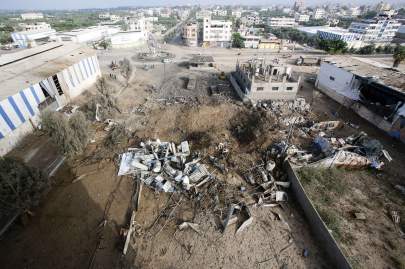Diplomatic Push to End Israel-Gaza Fighting Builds as Toll Rises

(Bloomberg) -- Fierce clashes between the Israeli military and rocket squads in the Hamas-ruled Gaza Strip spurred a concerted diplomatic push to end the most serious fighting to convulse the area since a 2014 war.
Egypt, the United Nations and the U.S. appealed for de-escalation as relentless Israeli air raids and Palestinian rocket barrages sent the death toll climbing. Forty-eight Palestinians have been reported killed in Gaza and six people in Israel since the violence abruptly exploded late Monday. Three Palestinians have died in confrontations with Israeli security forces in the West Bank.
The bombardments escalated sharply Tuesday evening as Hamas unleashed a massive volley of rockets at metropolitan Tel Aviv, Israel’s commercial heartland, and Israel’s south that overwhelmed missile defenses. Israeli Prime Minister Benjamin Netanyahu warned that “Hamas will pay a very heavy price for its aggression,” and a torrent of airstrikes followed, targeting military facilities, buildings used by the Islamic militant group, and key intelligence and military commanders.
Worried regional and international powers appealed for calm, and Palestinian media reported that Egypt, which traditionally has mediated Israeli-Gaza conflicts, will send separate delegations to each side Wednesday. The UN Security Council has scheduled a second emergency session on the crisis for Wednesday. U.S. President Joe Biden directed National Security Advisor Jake Sullivan and Secretary of State Antony Blinken to reach out to their Israeli counterparts.
The hostilities spilled over from weeks of clashes between Israeli security forces and Palestinians in contested Jerusalem. The holy city, home to Jewish, Muslim and Christian shrines, lies at the heart of the Israeli-Palestinian conflict, and competing claims to it have underpinned the latest confrontation.
“The occupation set this fire in Jerusalem and is responsible for any bombing that takes place,” Hamas leader Ismail Haniyeh said late Tuesday. “If the occupation wants to escalate, then the resistance is ready, and if it wants to stop, the resistance is also ready.”
The violence has set off a wave of protests by Israeli Arabs in support of the Palestinians, and unprecedented clashes with Jews and destruction of property in several cities. A state of emergency was declared on Tuesday in the central city of Lod, where Jews and Arabs live in a mixed community, after Arab assailants set synagogues, shops and cars on fire following the killing of an Arab resident by a Jewish man amid rioting a day earlier.
Israel and Gaza have skirmished repeatedly since Hamas took control of Gaza in 2007, and have fought three wars, the last seven years ago.
The current round has roots in tensions that have been festering since the beginning of the Muslim fasting month of Ramadan in April. Israeli restrictions on gathering at a traditional Ramadan meeting place outside Jerusalem’s Old City touched off the unrest, but after they were lifted, protests were rekindled by the threatened evictions of Palestinians from longtime homes in the eastern sector of the city that Israel captured in 1967. The Palestinians and much of the international community consider east Jerusalem occupied territory.
Fighting is flaring at a time when Netanyahu’s rivals are trying to piece together a government after the fourth election in two years, and it has already impeded those efforts.
Mansour Abbas, head of the Islamist United Arab List faction, froze negotiations to join that potential coalition, citing the ongoing conflict. The lethal surge in violence has made it untenable for Abbas to join a Zionist-led government at this time, but he told Israel Radio on Wednesday that he’ll go back to talks once the fighting is over.
Photo: © Photographer: SOPA Images/LightRocket Israel Vows Harsher Gaza Attacks as Sides Draw Nearer to War
Link: https://www.msn.com/en-us/news/world/diplomatic-push-to-end-israel-gaza-fighting-builds-as-toll-rises/ar-BB1gCfEu











